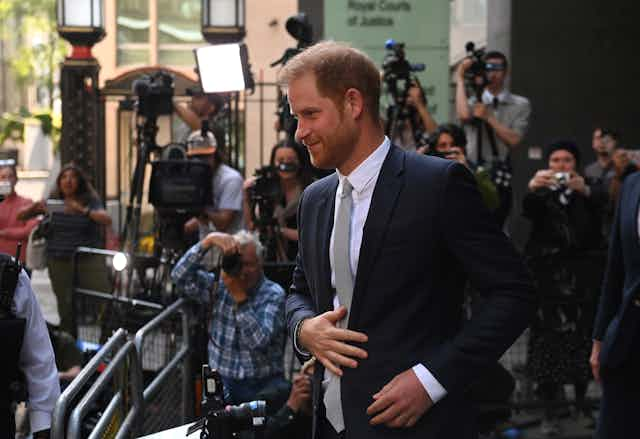A pivotal court judgment has found evidence that “habitual” phone hacking went on at Mirror Group newspapers for years.
The high court judgement from Mr Justice Fancourt left no doubt: “There is compelling evidence that the editors of each newspaper knew very well that [phone hacking] was being used extensively and habitually and that they were happy to take the benefits of it”.
This is an extraordinary vindication for Prince Harry, who has been determined to hold publishers to account for phone hacking and covering it up. It also has repercussions for the British press, since Fancourt’s judgment names a number of editorial and executive figures as complicit in the Mirror’s unlawful activities.
Fancourt found that phone hacking began in 1995 and was “widespread and habitual” from 1998. But unlawful activity by the press was not confined to hacking phones. A 2006 investigation by the Information Commissioner’s Office uncovered an “undercover economy” where hundreds of journalists were buying personal information.
In 2007, the News of the World royal reporter Clive Goodman was jailed after pleading guilty to hacking Prince William’s phone. Although the paper’s editor Andy Coulson resigned (claiming no knowledge of unlawful activities), the episode was dismissed as the miscreant activities of “one rogue reporter”.
Cursory investigations by the Press Complaints Commission (PCC) – the then industry regulator – concluded both in 2007 and 2009 that there was no evidence to suggest that unlawful practices were widespread or ongoing.
The Leveson inquiry
In 2011, after first refusing to reopen criminal investigations, the Metropolitan Police acted on further evidence and arrested a number of News of the World journalists. News International, the UK arm of Rupert Murdoch’s newspaper empire, made limited admissions in a few high profile cases. There the matter may have rested: a niche industry issue being doggedly pursued by the Guardian’s Nick Davies, but assiduously avoided by the rest of Fleet Street.
That changed with the revelation in July 2011 that News of the World journalists had hacked the phone of murdered teenager Millie Dowler. Murdoch responded to public revulsion by closing the paper.
David Cameron, prime minister at the time, then set up the Leveson inquiry – a two-part judicial investigation into the culture, practices and ethics of the press.
During the first part of the inquiry, senior editorial figures across the UK’s national titles gave sworn evidence that their newspapers had no part in phone hacking or any other forms of unlawful information gathering.
In 2012, Leveson recommended a new framework for independent press regulation, with incentives for publishers to join up. Parliament agreed (overwhelmingly) but the press refused to participate. Instead, they set up their own complaints body, the Independent Press Standards Organisation (Ipso), to replace the discredited PCC.

They lobbied furiously against key components of the Leveson framework, arguing that forcing them into a regulator that would actually maintain standards was a threat to press freedom. And anyway, went their argument, the industry was now reformed.
As in previous decades, the government caved. In 2018, it cancelled the second part of the Leveson inquiry, which was supposed to investigate who authorised unlawful activities and the extent of any collusion between the press and the police. It has since committed itself to repealing legislation that would give real teeth to the Leveson framework.
Throughout this period, Murdoch’s News Group has been quietly settling claims to a reported total cost of around £1.2 billion, while repeatedly denying any unlawful activity at the Sun. Just this month it agreed a six-figure payout to former Liberal Democrat cabinet minister Chris Huhne for intrusions allegedly ordered by company executives.
Before Fancourt’s judgement, the Mirror publisher had made limited admissions in 2014 (again after repeated denials) with a fulsome apology across its titles. The most recent judgment covered both further hacking claims (including Prince Harry’s) and other unlawful techniques that were again furiously denied during the trial as “fantastical” and “in the realms of pure speculation”.
The truth outs
Over the past 20 years, the police, which failed to properly investigate, the British legal system, which allows cases to be settled without the evidence being made public, and parliament, which allowed Leveson to be cut short, have comprehensively failed to hold a powerful industry to account.
Fancourt even found that hacking continued during the Leveson inquiry itself – an extraordinary demonstration of press contempt for the legal and judicial process. That it should take the resources and determination of Prince Harry to elicit the truth in court is an irony that will not be lost on many journalists.
The truth about the extent of unlawful information gathering by the press is finally emerging – and there are further cases against the Sun and Mail titles due in court over the next 18 months.
Meanwhile, ordinary victims of press wrongdoing still have no protection. In 2021, my colleague Dr Gordon Ramsay and I produced a report detailing how Ipso is owned and controlled by the media companies it is supposed to regulate.
Although Ipso says that it works “to promote high editorial standards and provide accountability where there are shortcomings”, our findings suggested otherwise: that Ipso is either unwilling or unable to deal properly with complaints or to impose sanctions, and is therefore a wholly ineffectual regulator.
But politicians still fear the power of the press. Circulations may have plummeted, but newspapers and their websites set agendas that are followed by broadcasters. Political parties want their readers’ votes.
Any real and meaningful change will depend on the courage of a new government to reverse decades of inaction and introduce a regulatory framework that does not rely on a wealthy royal warrior to bring justice. If recent press reports are to be believed, Labour leader and prime ministerial hopeful Keir Starmer may be the next to duck any political responsibility for action.

